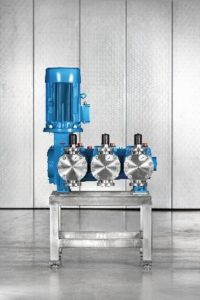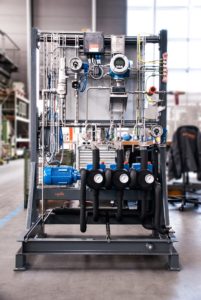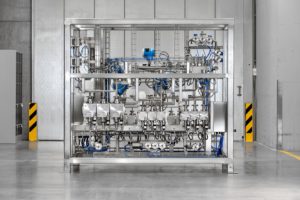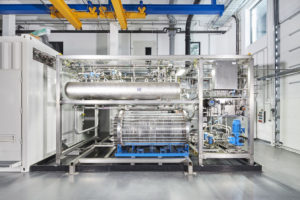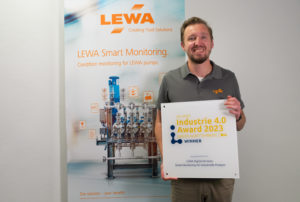Aseptic Process Diaphragm Pump for Field Trials on Homogenization of Demanding Emulsions
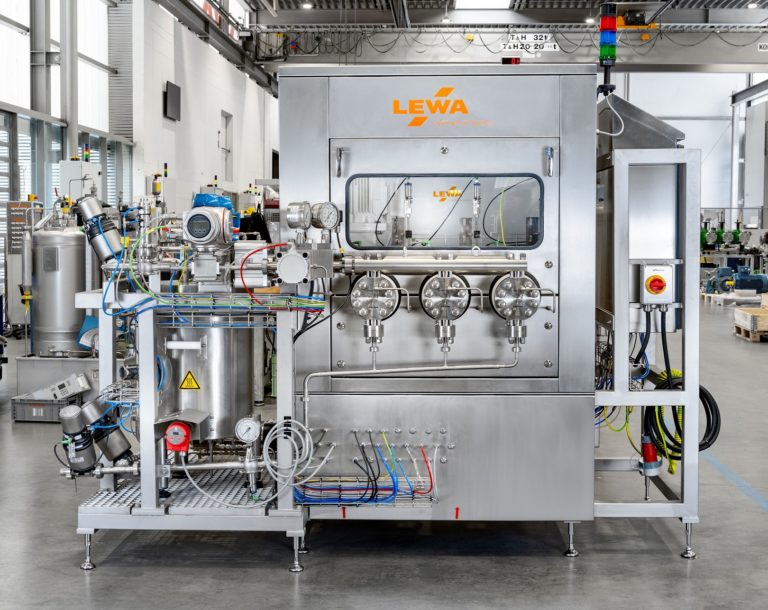
All system components are selected according to hygiene requirements and mounted on a common base frame, making the system particularly suitable for pilot or small batch processes thanks to its compact and space-saving design. (Image source: LEWA GmbH)
Emulsions are finely dispersed mixtures of normally immiscible liquids. They end up on consumers' tables as homogenized milk in the food sector, for example. They primarily consist of water, fat and protein. According to their nature, the fat droplets contained in raw milk are not very homogeneous. For process engineering reasons, it is therefore important to reduce their size in advance and achieve an even distribution. This is the only way that the end product can meet both the quality requirements of the manufacturer and consumer expectations. However, as there are increasingly demanding emulsions in other areas besides the familiar milk, such as baby food, pharmaceuticals, cosmetics or fine chemicals as end products or even just intermediate products, which require the highest purity in particular, LEWA has developed the LEWA homogenizer test system. The system can be used to test the aseptic functioning of a homogenizer based on a hygienic hermetic process diaphragm pump. Thanks to a homogenizing valve that is also hygienic, it can be flexibly adjusted to the requirements of different emulsions. The compact system can be integrated into both the circuit ("stand-alone") and the process line, enabling it to be continuously operated aseptically. The fluid is supplied via an integrated heatable vessel or a separate media connection.
Not too creamy, not too runny: everyone knows how challenging emulsions are: be it mixing a salad dressing or preparing a stable Béarnaise sauce in your own kitchen. The requirements of industry go far beyond those of kitchen preparation. "In addition to knowledge of dispersion technology, there is an increasing focus on hygiene requirements and uninterrupted robustness in industrial production. And this is where the advantages of hermetic homogenization or spray tower pumps come into play: for example, to maintain a stable and pure product quality after heat treatment," said Dr.-Ing. Hans-Joachim Johl, Lead Product Manager Life Sciences/Clean Processes at LEWA GmbH. Put simply, the piston diaphragm pump is the heart of the system for conveying fluids under high pressure through a narrow opening. Due to the high shear and the resulting collision of the droplets, they are crushed and evenly distributed. Alongside a high-pressure pump used as a pressure generator, the systems used in this field consist of a hydraulic consumer, which is called the "homogenization valve." This often has a two-stage structure to counter the re-agglomeration of fat droplets, for example.
The pump experts from Leonberg, Germany, have developed a new rental and test system to meet the stringent requirements of an efficient dispersion process from both the hygiene and process engineering perspectives. It is based on proven triplex pump technology and, thanks to its compact design and flexible control system, can be easily integrated into pilot or even production environments. In particular, products with unusual requirements such as fluids with high undissolved abrasive components (e.g. calcium carbonate, tricalcium phosphate) can be tested with the system from LEWA. Even small quantities of expensive fluids can be tested in "stand-alone" operation without any problem.
Optimal results from the interplay between pump and valve
The heart of the system is the proven LEWA triplex high-pressure process diaphragm pump. It ensures that the process fluid flows through the integrated two-stage homogenization valve at the required flow rate and pressure. It is dynamically controlled and is designed for a maximum pressure of 400 bar and a flow rate of up to 150 l/h in the test system. The LEWA triplex piston diaphragm pump also offers a decisive advantage for homogenization: Due to its design, the diaphragm pump does not require dynamic sealing systems. The PTFE sandwich diaphragm – additionally equipped with leakage detectors – ensures a hermetically sealed working chamber, such that no emission or leakage of substrate or cleaning media or contamination of the fluid can occur. In addition to this function, which enables aseptic process control, all media-relevant components are designed in accordance with the applicable hygiene specifications, e.g., the "Hygienic design of pumps, homogenizers and steaming equipment" EHEDG guidelines, and are easy to clean inline (CIP, SIP) – but also easily accessible for inspection and maintenance purposes.
"The actual homogenization process benefits from the close interplay between customer-specific conveyor units and system components," explained Dr. Johl. First, a hygienic twin screw pump generates a specified inlet or suction pressure on the suction side of the high-pressure pump, which is particularly important for higher viscosities. Next, the speed-controlled high-pressure diaphragm pump conveys the fluid at the required flow rate to a preselected pressure P2 in the second stage. The valve remains pneumatically closed according to the selected pressure. As soon as the pressure and pump capacity are reached, the homogenization valve of the first stage closes to the extent that the specified value also applies there. The valve of the second stage is now no longer controlled. "The ratio between the pressures is usually P2 < 1/5 x P1, but it can also be freely selected. The homogenization pressure of the first stage, which is now leading, is maintained by pneumatic valve control of the dispersion gap. In this way, the homogenization process remains virtually free from pressure fluctuations. The choice of type and design of the homogenization valves can be specified by the customer for later scaling of production systems. Due to sufficiently selectable pressure reserves, a later system can also directly supply a downstream spray drying step, which further increases the efficiency and flexibility of the process.
Compact design and flexible control for versatile use
All components are designed for hygiene and are mounted on a common base frame with a "wash-down housing" for the pump drive. This compact design enables the system to be installed such that it saves space in the production environment. Depending on whether it is operated in a circuit or continuously, the fluid is supplied via either the integrated heatable double-walled tank with a capacity of 60 l or a separate media connection. In addition, the LEWA smart control control system is integrated into a control cabinet mounted on the metering frame: also in hygienic design. Various modes and preconfigured operating sequences (cleaning, homogenizing, etc.) are pre-installed for simple and flexible operation. "The safety of the system is rounded off by various protective measures: a safety valve that can be automatically vented for cleaning to protect the system against overpressure on the low-pressure side, a pump-integrated pressure relief valve on the high-pressure side and various pressure and temperature transmitters for process monitoring, as well as visual and acoustic warning elements," added Dr. Johl.
From March 19 - 22, 2024, visitors to Anuga FoodTec in Cologne will have the opportunity to experience the LEWA homogenizer test system in action. Dr. Hans-Joachim Johl and other LEWA experts look forward to answering questions and having interesting discussions.
Source: LEWA GmbH

